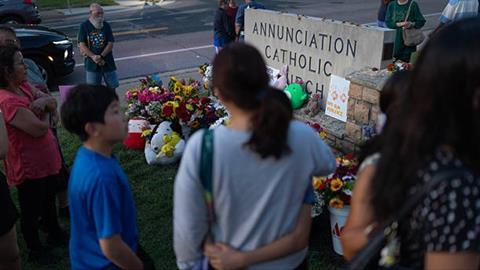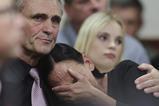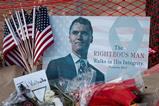A shooting at Annunciation Catholic Church in Minneapolis has left two children dead and 17 injured. In the midst of such tragedy, it’s easy to dismiss prayer in favour of more tangible responses, but Billy Hallowell urges that it is still the most powerful tool in the Church’s arsenal

America is once again reeling from yet another mass shooting that left two children dead and 17 others injured during Mass and prayer inside Annunciation Catholic Church, a house of worship in Minneapolis, Minnesota.
The horrific event — purportedly perpetrated by a trans-identifying gunman — is the latest in a slew of mass casualty tragedies, with the startling increase in attacks on churches and Christian institutions across the US in recent years becoming a disturbing, undeniable pattern.
When such tragic horrors unfold, the gut reaction among some critics is to demand immediate political action and lash out against “thoughts and prayers,” often telling people that these sentiments are worthless in the wake of the unthinkable.
Minneapolis Mayor Jacob Frey, among others, responded to the tragedy by invoking language that is often considered controversial in relation to invocations.
“These were American families, and the amount of pain that they are suffering right now is extraordinary,” Frey said. “Don’t just say this is about thoughts and prayers right now. These kids were literally praying.”
It’s impossible to know what Frey was implying here, as emotions are high after such events, but here’s what I do know without a doubt: as humans and believers, prayer is the most powerful tool in our arsenal.
Tragically, we often respond to these events in the wrong ways, evading our need for God in exchange for material change. Rather than making political proclamations or targeting prayer, we must adopt a different approach.
Context is king
First, we have to properly contextualise and understand evil. Ephesians 6:12 makes it clear we’re enmeshed in a spiritual battle, with forces we cannot see impacting matters in our realm. This dynamic, mixed with the whims of free will, sometimes leads us into travesty.
With that in mind, there’s no other way to frame what happened in Minneapolis — a person shooting through church windows at children in an effort to claim innocents — other than diabolical evil.
It’s a real-life manifestation of Satan’s quest to kill, steal and destroy (John 10:10), and a failure to understand, at the very least, the existence of this evil renders us unable and ill-equipped to make real, effective change.
The power of prayer
Second, we must properly understand why people offer prayer after mass casualties. While it’s certainly true Christians appeal to God for an end to such violence, the primary goal of these post-shooting prayers is often quite different. We recognise the intense emotional and spiritual needs victims and loved ones have after facing such trauma.
Thus, these prayers are aimed at asking God to provide supernatural comfort, love, and peace in the midst of uncertainty, to offer leaders knowledge about how to move forward, to imbue calmness in first responders who have witnessed the unthinkable and to seek clear minds as everyone else tasked with picking up the pieces.
In these moments of profound pain, Christians are called to fill the gaps and live out Christ’s command to love God and others
Beyond that, James 1:5 makes it clear that God is prepared and willing to give us all the knowledge and wisdom we need to progress through life. When uncertainty arises, these promises remain in effect: “If any of you lacks wisdom, let him ask God, who gives generously to all without reproach, and it will be given him.”
Furthermore, the idea that we can respond or cope with an event like this without God is rooted in folly. Proverbs 1:7 proclaims that: “The fear of the Lord is the beginning of knowledge; fools despise wisdom and instruction.”
If we’re looking to fix our problems, the source of the best blueprint for the future is the very Lord some want to dismiss in the wake of hatred and evil. We’re not called to selective invocation; as 1 Thessalonians 5:17 affirms, we’re to “pray without ceasing”.
Standing in the gap
Third, we must look for ways to practically and sufficiently help communities reeling from the impact of violence. This might come in the form of financial or material assistance, spiritual and emotional care and other practical means.
In these moments of profound pain, Christians are called to fill the gaps and live out Christ’s command to love God and others. It’s easy to get on social media or in front of a microphone to demand gun control, but this isn’t the primary place we should start.
Now, that brings us to the proverbial elephant in the room: the need for action. After we’ve taken these initial steps, people must come together to have a rational, calm and reasoned conversation about what steps, if any, can legislatively be taken to prevent future events.
These discussions should happen with love and grace, but make no mistake: the root cause of these shootings is a disconnect from the eternal and the rage of evil. And those forces must be primarily fought spiritually, with prayer guiding even the legal actions that are considered.
There’s no shortage of debate over gun control and how to progress, but there should be no quibbling over the fact that we’re called to understand evil, pray for peace and step out to help — and that should always be our initial posture before critique.






































1 Reader's comment